Daniel Im's Blog, page 8
March 24, 2020
A Vicious Cycle

Are you familiar with the parable of the rich fool? I’d tell it myself, but Jesus does it better.
A rich man’s land was very productive. He thought to himself, ‘What should I do, since I don’t have anywhere to store my crops? I will do this,’ he said. ‘I’ll tear down my barns and build bigger ones and store all my grain and my goods there. Then I’ll say to myself, “You have many goods stored up for many years. Take it easy; eat, drink, and enjoy yourself.”
What I love about Jesus’ parables is that they’re as applicable today in the 21st century, as they were in the 1st century. And what’s amazing is that the more you dig, the more you’ll find—this is true for the entire Bible. For example, while the crowds listening in on Jesus would’ve been shocked by the story, it’s likely for different reasons than us. Here’s why.
On the surface, it seems foolish that the man would first tear down his barns before building bigger ones. Perhaps his older barns were dilapidated? Or maybe he didn’t have enough land for additional barns? Both seem unlikely because this man was already rich, even before his year of plenty, which means he likely took care of his property.
And it’s not like we’re talking about Manhattan here, so the fact that he already had more than one barn shows us that he likely had room to build more. So why didn’t he just add on to his additional barns? And if he was already rich, why didn’t he give some of his crops away?
While these are the questions that naturally come to mind for a 21st century reader, Jesus’ initial listeners would’ve been shocked for different reasons.
Try reading through the parable again and counting how many times the rich man uses the personal pronoun. And did you notice to whom he was speaking?
In Jesus’ day, this is not how people functioned.
Ancient Near Eastern culture was not individualistic; people didn’t grow their own fiefdoms and keep their wealth to themselves. Rather, life was lived together, with one another, and in community.
So why is this rich man isolated and making the decision by himself? Especially when his decision would affect everyone else around him. How long has he been isolated and disconnected from those around him? How long has it been since he’s trusted someone else? And how long has he lived inside of his own vacuum of reality?
No wonder he’s become so obsessed with himself. Isolation is the end result of disconnection. I love how King Solomon puts it, “One who isolates himself pursues selfish desires; he rebels against all sound wisdom.”
Isolation is the end result of disconnection.
Click To Tweet
The more disconnected and isolated you become, the more you’ll turn inward and grow obsessed with yourself.
Eventually, my current needs, my future needs, and my contingent what-if needs, will be all that you can think of. Even when you’re “helping” others, it will always be in view of what you can get out of it, or for that time when they can repay you back. And instead of recognizing and being grateful for the role that others have played in your life, you will reframe and reinterpret reality through the lens of me, myself, and I.
The more disconnected and isolated you become, the more you’ll turn inward and grow obsessed with yourself.
Click To Tweet
This is how it happens. After getting a promotion, you begin thinking to yourself, “I got this because I deserved it,” rather than recognizing the role your boss and teammates played. Or after receiving an admissions letter, you begin saying to yourself, “Wow, all those years of hard work paid off,” instead of being grateful for the sacrifices that your parents made, and the role that your teachers and mentors had in your education.
It’s a vicious cycle.
The more you turn inward and reinterpret the past through this self-centered obsessive way, the more disconnected you’ll become.
And the more you disconnect from others, the more you’ll see life through the lens of giving and taking. Your relationships with others will turn into meaningless consumeristic transactions. And instead of viewing life with an abundance mindset, you’ll begin seeing everything through the lens of scarcity. Instead of living a life of generosity, you’ll scrape by with greed. And on and on it goes.
To learn more about the truth on the other side of this vicious cycle and lie that it’s rooted in, pick up a copy of my new book, You Are What You Do: And Six Other Lies about Work, Life, and Love.

March 17, 2020
In Doers We Trust?

Blank stare. Tossed hair. And a longing to be elsewhere.
If you’re up for it, let’s play a game of “Guess Who?” It’s simple. Just try and guess who I’m looking at right now.
Hangry, irritable, and unable to focus.
Is a picture of someone forming in your mind? Here are a few more descriptors: Piles of dirty laundry, protein bar wrappers in the trash, and a cup of coffee that’s been warmed up one too many times.
If you guessed a prisoner, an executive, or a working parent, you’re close, but not quite there yet. If you guessed yourself, you’re closer, but that probably means one of two things—you’re either sleep deprived or a doer.
Recently, one of the largest online marketplaces for freelancers ran an ad campaign in New York subways plastering up headshots of doers and excerpts from their interviews. They called this campaign, “The Year of Do,” with the catchy tag line, “In Doers We Trust.”
Here’s the excerpt from the ad I’m looking at, “You eat a coffee for lunch. You follow through on your follow through. Sleep deprivation is your drug of choice. You might be a doer.”
Apparently doing has become a badge of honor. A status symbol. And the way to define ourselves.
Apparently doing has become a badge of honor. A status symbol. And the way to define ourselves.
Click To Tweet
Freedom and flexibility
When traveling, one of my favorite things to do is talk to my Uber driver. I’ve been driven around by college students, graduate students, cyber security analysts, insurance agents, retired veterans, full-time moms, an HOA president, and a guy in finance who had just lost his job because his CEO and CFO went to prison.
Although they all have different reasons for driving, a common theme I’ve heard over and over again is a desire for freedom and flexibility—regardless of age, ethnicity, and whether they were doing it part-time or full-time. Since freedom and flexibility are hallmarks of the gig economy, this makes complete sense.
Freedom and flexibility are hallmarks of the gig economy.
Click To Tweet
One of my favorite conversations was with a fifty-something full-time mother, who for the first time in 30 years was earning a paycheck outside of the home. Since she could drive whenever she wanted to, Uber was a perfect fit for her to earn “spending money.” So several nights a week from 9 pm to 1 am—since by that time everything has settled down at home—she gets in her car, opens up the app, and starts her side hustle.
I remember this other conversation I had with Melissa, a single mom who, after putting in a full day as a cleaner, would drive for Uber in the evenings and weekends to support her three teenagers. Her dream is to start her own cleaning company one day, but in the meantime, driving an extra 20 hours a week does the trick to pay for those “dang expensive pizza pockets,” in her words.
I could go on and on and tell you about the number of dads I met who were driving for Uber, as a side hustle, to pay for extra expenses. Others who were driving to save up for their children’s college tuition. And still others who would rather earn some extra spending cash than relax with their family on the weekend.
I’ve even met individuals who see their side hustle as the new credit card. Instead of going into debt to go on vacation, they just gig a few hours a week to save up. This is the new normal.
The side hustle is the new credit card.
Click To Tweet
Let’s get back to the “Guess Who?” game. It’d be one thing if the lady on this poster looked happy, but she doesn’t. Sure, by doing more—or gigging—she might have earned some extra cash, but was it worth it?
She looks miserable, scattered, anxious, dehydrated, and emotionless.
If this is the end result of doing, I don’t want it. It doesn’t look like much of a status symbol to me. In doers, I don’t want to trust.
To learn more about the gig economy and why freedom and flexibility is the core lie of our age, pick up a copy of my new book, You Are What You Do: And Six Other Lies about Work, Life, and Love.

March 10, 2020
7 Lies The World Tells Us, 7 Biblical Truths That God Tells Us
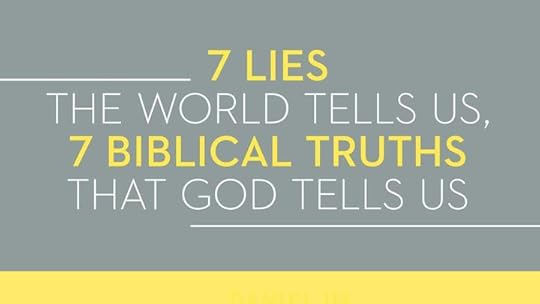
Did you know that there’s a YouVersion Bible Reading Plan to go along with my newest book?
It’s seven days long and a great way to dig deeper and reflect on the 7 biblical truths that are on the flip side of the 7 lies that the world is shouting at us.
I want to invite you to start this reading plan today, and perhaps you can invite a few friends to join you while you’re at it!
Click here to get started.

March 3, 2020
A New (or Ancient) Way of Addressing the Lies of our Culture

The gig economy affects everyone and everything. It’s the new normal and it matters.
But as I’ve been sharing over the past few weeks, it’s not all that it’s cracked up to be. The seven lies of the gig economy all hold a critical role in the way that you see yourself, but they are not the way to see yourself because they all come up short.
They’re incomplete precisely because they’re half-truths. As a result, there are unintended consequences behind each and every one of them.
This is why you can’t let any of these lies become the primary lens through which you view yourself, and also why we’re so particularly vulnerable to these lies.
Living according to the lies of the gig economy is like living in chains.
It’s tiring.
It’s a grind and a hustle just to try and keep up. And it’s actually a fool’s game because you will never feel caught up.
Living according to the lies of the gig economy is like living in chains.
Click To Tweet
However, following Jesus leads to freedom because following him is a decision to follow the truth. It’s a decision to walk out of darkness and into the light.
He said it himself: “I am the way, the truth, and the life. No one comes to the Father except through me” (John 14:6), and “anyone who lives by the truth comes to the light” (John 3:21).
Following Jesus leads to freedom because following him is a decision to follow the truth
Click To Tweet
It’s fascinating how Jesus addressed the lies of his culture.
In the Sermon on the Mount, he would point out the lies and half-truths by saying, “You have heard it was said…” and then he would respond with the truth, “But I tell you…”
“You have heard that it was said to our ancestors, Do not murder, and whoever murders will be subject to judgment. But I tell you, everyone who is angry with his brother or sister will be subject to judgment.” (Matt 5:21-22)“You have heard that it was said, Do not commit adultery. But I tell you, everyone who looks at a woman lustfully has already committed adultery with her in his heart.” (Matt 5:27-28)“You have heard that it was said, An eye for an eye and a tooth for a tooth. But I tell you, don’t resist an evildoer. On the contrary, if anyone slaps you on your right cheek, turn the other to him also.” (Matt 5:38-39)“You have heard that it was said, Love your neighbor and hate your enemy. But I tell you, love your enemies and pray for those who persecute you, so that you may be children of your Father in heaven.” (Matt 5:43-45)
and on and on he would teach…
What if, 2000 years later, we followed the ancient ways of Jesus and taught and interacted with our culture in the same manner?
Where, using the lies and the corresponding truth from my book, You Are What You Do: And Six Other Lies about Work, Life, and Love, we say:
You heard it was said, “You are what you do,” but I say to you “You are a child of God.” (John 1:12)You heard it was said, “You are what you experience,” but I say to you, “You are a new creation” (2 Cor 5:17)You heard it was said, “You are who you know,” but I say to you, “You are known by our loving Savior, Jesus” (John 10:27)You heard it was said, “You are what you own,” but I say to you, “You are complete in Jesus” (Col 2:9-10)You heard it was said, “You are who you raise,” but I say to you, “You are God’s masterpiece” (Eph 2:10)You heard it was said, “You are your past,” but I say to you, “you are free from all condemnation in Christ Jesus” (Rom 8:1-2).
This is the truth on the other side of these lies.
And when our culture sees this and hears the truth as we share it with gentleness and respect (1 Pet 3:16), their status will change from slave to child.
From enslaved to free.
From no inheritance to full inheritance.
From worker to heir.
And from being defined by what they do, what they experience, who they know, what they know, what they own, who they raise, and their past, to being defined by what Jesus has done for them.
Essentially, from ashes to beauty.
What an opportunity to present the truth of the gospel.
To learn more about each of these lies and the truth on the other side, pick up a copy of my new book, You Are What You Do: And Six Other Lies about Work, Life, and Love.

February 25, 2020
The Unintended Consequences of the Gig Economy
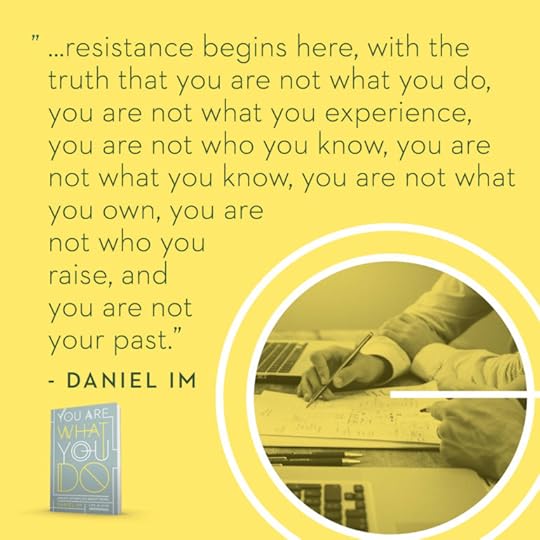
In our culture today, doing has become a badge of honor.
It’s become a status symbol and the way to define ourselves.
The same is true with the rest of the lies of the gig economy that I breakdown in my new book, You Are What You Do: And Six Other Lies about Work, Life, and Love.
Doing has become a badge of honor. It’s become a status symbol and the way to define ourselves.
Click To Tweet
Our sense of meaning and significance have become tied to our experiences, our relationships, our knowledge, our stuff, our children and our past. However, the thing with each of these lies is that they all have unintended consequences.
A life of doing leads to a life of worryingA life of experiences leads to a life of comparisonA life seeking acceptance from others leads to a loss of selfA life focused on the pursuit of knowledge leads to a life of despairA life amassing stuff leads to a life of imprisonmentA life that revolves around your children leads to a life of narcissismAnd a life lived in the past leads to a life of regret and pain
When we actively resist these seven lies and instead pursue the alternative path that I propose in my new book, we’ll begin experiencing what true freedom and flexibility feel like, which, ironically, is the very thing that our culture falsely promises through these seven lies:
You are what you doYou are what you experienceYou are who you knowYou are what you knowYou are what you ownYou are who you raiseYou are your past
This is the kind of resistance that chooses love over hate, light over darkness, forgiveness over shame and generosity over greed.
It’s the kind of resistance that uncovers who we aren’t, so that we can begin the journey of discovering who we really are.
We need to uncover who we aren’t so that we can begin the journey of discovering who we really are.
Click To Tweet
And this kind of resistance begins here with the truth that you are not what you do, you are not what you experience, you are not who you know, you are not what you know, you are not what you own, you are not who you raise and you are not your past.

February 18, 2020
Cauliflower, Podcasting, and Amazon Prime

(The following is an excerpt from the Introduction of my newest book, You Are What You Do: And Six Other Lies about Work, Life, and Love)
If there’s anything constant in life, it’s change.
Just consider how commonplace cauliflower, podcasting, and Amazon Prime have become—and how quickly it’s happened.
If there’s anything constant in life, it’s change.
Click To Tweet
Growing up, no one ever talked about cauliflower, let alone wanted to eat the tasteless and smelly thing.
Yet recently, you’ve probably tried (or heard of) cauliflower rice, cauliflower pizza crust, cauliflower buffalo wings, or cauliflower tots. And if you haven’t, your friends have. Now just to give you a sense of its meteoric rise, in a short span of three years, Green Giant has gone from harvesting five to thirty acres of cauliflower each week. That’s 100,000 heads of cauliflower every single day! And they are just one of the many companies that have hopped on the cauliflower bandwagon.
A similar thing has happened with podcasting.
When I started listening to podcasts in 2008, it was a multistep process that required a computer. Today, however, with the ubiquity of smartphones, listening to podcasts has become so commonplace and normal that the question has shifted from “Have you heard of podcasts?” to “Which podcasts do you listen to?” In fact, in the last five years, close to half of all Americans and Canadians tuned into their first podcast episode.
And let’s not forget the explosive growth of Amazon Prime.
Now that more than half of all American households are subscribing members, isn’t it odd to meet someone who doesn’t have it? It’s definitely become the exception, rather than the norm.
Imagine going to the grocery store and half of the produce was rotten.
Would you notice? If you were driving home from work, would you notice if half of the cars were off the road? And what if you ordered a burger from your favorite restaurant and half of it was missing?
By the time something reaches the 50 percent mark, wouldn’t you have to be living in a hole to miss it? Unfortunately though, noticing doesn’t necessarily lead to action.
Noticing doesn’t necessarily lead to action.
Click To Tweet
Noticing the negative grade around your house doesn’t necessarily mean that you’ll fix it right away. Seeing the check engine light go off doesn’t necessarily mean you’ll drop everything and take your car into the shop. And realizing that your pants are fitting tighter than before doesn’t mean that you’ll immediately go on a diet.
Moments of change happen when things shift from being a problem to being my problem.
Click To Tweet
Moments of change happen when things shift from being a problem to being my problem. These are the moments we transform into action mode—moments when we find water in our basement, are stuck on the side of the road, or realize that nothing we have fits anymore.
While this might be true for the things that are happening to you, what about all the change that is happening around you—around us in society today?
With trends like the ones mentioned above, rising and falling so rapidly, is there a way to tell the difference between fads and fundamentals? Between the passing and permanent? Between fidget spinners and artificial intelligence?
Things Have Changed
When I moved to Nashville in 2014, I noticed something. I didn’t realize how critical of a trend it was going to become, the extent that it was going to impact everyday life, the rapid rate at which it was growing, or how it was going to become the new normal, but it seemed like everyone had a side hustle or a gig.
Okay, maybe not everyone, but close to half of the people I met. And for the majority of them, these gigs weren’t their main source of income—a lot of them were hustling, contracting, and moonlighting on the side to earn some extra cash, pay down debt, or save up for a vacation.
It was kind of like cauliflower, podcasting, and Amazon Prime—no matter where you went, it was hard to miss. Heck, even I was a part of this trend with all the writing, podcasting, consulting, and speaking I was doing on the side.
At first, I thought this was an American thing, since I had just moved to the States, but after talking to friends in Canada, reflecting back on the time my wife and I lived in Korea, and doing some research, I quickly realized how much of a global trend this was becoming—and how rapidly it was growing.
While there’s no consensus on what to call this new normal—gigging, freelancing, contracting, side hustling, moonlighting—the important thing is to know what it is and how it’s affecting you because it’s here to stay. Some experts refer to it as the gig economy, but don’t let that scare you. It’s just a label. This isn’t a book on finances, economics, blockchain, or getting rich off of cryptocurrency—it’s actually quite the opposite.
The gig economy is here to stay. Do you know how it’s affecting you?
Click To Tweet
As long as you haven’t cloistered yourself off from the rest of the world in an isolated “off-the-grid” commune where you’re stuck in time and nothing ever changes, you will find this book helpful. Just think of it as a pair of glasses that will bring this new normal into focus, so that you can see all the subversive ways that it’s trying to change the way you approach work, life, and love.
To continue reading, click here to download the rest of the Introduction and Chapter 1 of my new book, You Are What You Do: And Six Other Lies about Work, Life, and Love.

February 11, 2020
The New “Normal” and Why It Matters

Our definition of “normal” has changed—seemingly overnight.
For example, working a steady nine-to-five job isn’t normal anymore. And waiting until you’re retired to explore the world, try new experiences, eat delicious food and enjoy life isn’t normal either—if retirement is even a thing anymore.
What’s now “normal” is this desire that we all have for freedom and flexibility, which conveniently is exactly what the gig economy promises.
A desire for freedom and flexibility is the new normal—and this is exactly what the gig economy promises.
Click To Tweet
And contrary to common belief, this is not just something that affects those in their 20s and 30s. According to the research, there are people in every generation who have side hustles because this desire for freedom and flexibility has become our new oxygen. It’s the air we breathe and the water we drink. In fact, it’s become so commonplace that it’s no longer the exception—and it’s affecting everything and everyone.
You don’t even need to be working in it for it to affect you.
Just think about the last time you bought something off of Facebook Marketplace, rode in an Uber, ordered food using Grubhub, slept at an Airbnb or got your IKEA furniture assembled by a Tasker from TaskRabbit. That was all possible thanks to the gig economy and someone else’s side hustle.
The same is true even without an app, because every time you get a haircut, hire a contractor, have your lawn mowed or hire a babysitter, you are also funding the gig economy.
This is why I wrote my new book, You Are What You Do: And Six Other Lies about Work, Life, and Love.
I wrote it because I wanted to examine the ways that this new “normal” is affecting everyday work, life and love. And as I was digging into the research and examining the ways that this new “normal” was affecting the people that I interact with on a regular basis, I discovered seven lies that were subtly and subversively affecting us right to our core:
You are what you doYou are what you experienceYou are who you knowYou are what you knowYou are what you ownYou are who you raiseYou are your past
In You Are What You Do, not only do I show you how to recognize these everyday lies in your life—and why it’s sketchy to build your life upon them—but I also unpack the truth on the other side.
There’s truth on the other side of these lies—the kind of truth that leads to freedom.
Click To Tweet
The truth that leads to freedom. The truth that will move us from surviving to thriving. And ultimately, the truth that will unlock a life of purpose, adventure, meaning and destiny.
Learn more about the new “normal” and how this affects your everyday work, life, and love by picking up a copy of my book here, or wherever books are sold.

February 3, 2020
You Are What You Do: And Six Other Lies about Work, Life, and Love
Two years ago, the editors from B&H Publishing Group sent me a text message:
That’s it. That’s your next book.
I wasn’t planning on writing another book this soon, nor did I ever envision writing one on this topic, but once they sent me that text message, I couldn’t get the idea out of my head.
I was at a conference speaking on the implications of the gig economy for the church and for church leaders.
And that’s all it was supposed to be—a talk that was birthed out of research that I stumbled onto.
But once I started to think through (and research) the implications of the gig economy on everyday life, I was convinced. This book had to be written—and I guess it was going to be by me.
In the last few years, there’s been a significant shift in the way that we approach work, life, and love.
And it’s all because of the rise of the side hustle—or the gig economy as experts like to put it. It’s become the new normal. In fact, these days, if you don’t have one, you’re likely funding someone else’s.
The side hustle—or the gig economy—has become the new normal.
Click To Tweet
But here’s the thing, this is not some sort of neutral and harmless shift in culture. There’s actually a complex and fragile web of lies holding it all together, leading to a devastating pile of unintended consequences.
In my book, You Are What You Do: And Six Other Lies about Work, Life, and Love, my hope is to shed light onto these lies and their unintended consequences so that everyone can see the truth on the other side.
The truth that leads to freedom. The truth that moves us from surviving to thriving. The truth that will unlock a life of purpose, adventure, meaning, and destiny.
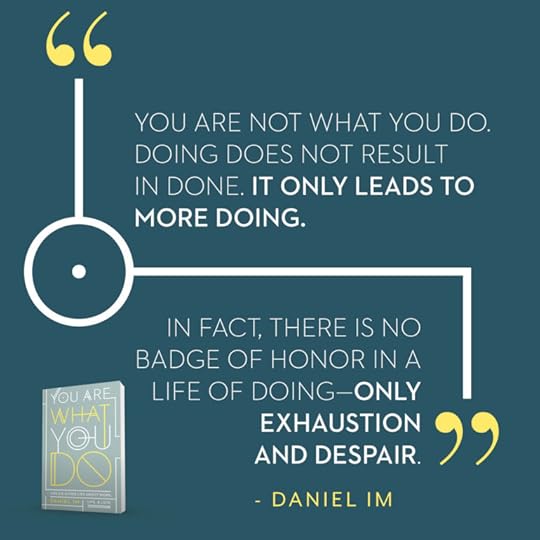
Doing does not result in done. It only leads to more doing. In fact, there is no badge of honor in a life of doing—only exhaustion and despair.
Click To Tweet
This book is for…
So if you’re a mom who’s rediscovering herself as her children are growing older, this book is for you.
If you’re a dad who’s wrestling through the tension of being present for his children, while also trying to make ends meet and provide for his family, this book is for you.
If you’re a student who is not convinced that a traditional nine-to-five job is right for them, this book is for you.
If you’re someone who wants clarity around your purpose and identity, since there’s such cultural confusion about who we are and where our worth comes from, this book is for you.
And lastly, if you are tired of the hustle, grind and go of life and want to experience something different, this book is for you.
You can learn more about my book here, or pick up a copy wherever books are sold.
January 28, 2020
Church Leader! The Gig Economy Matters and This is Why

The gig economy is the new normal and it’s changing everyday life.
If you have no idea what I’m talking about, you can read last week’s article for context. But last week, I addressed seven ways the gig economy is affecting everyone in our culture today—especially those in your church.
In short, the gig economy is changing the way that we view ourselves—and it’s not for the better.
Here’s the thing though. The gig economy not only affects everyone in your church—whether they’re Christian or not—but it also affects your leaders and how you should approach leadership in the church.
Let’s start with your changing congregation.
On a practical level, since the gig economy is the new normal, this means that close to half of your congregation is probably working more than one job.
Close to half of your church is probably working more than one job.
Click To Tweet
So have you considered how this should affect:
Your approach to streaming your service?Attendance patterns and measuring engagement in your church?Preaching on and discipling your church on issues of faith and work?When and how you offer leadership development and training?
On a side note, if you haven’t read chapter three of my book, No Silver Bullets, where I talk about the shift that we need to make “from being the sage on the stage to being the guide on the side,” you’re going to want to pick it up. In that chapter, I illustrate how you can flip the classroom and offer both a high tech and high touch approach to leadership development
There’s also the issue of money and multiplication.
If you’ve read anything on movements—particularly church planting movements—you’ll know that money and education are two massively stifling factors to movemental energy.
So if you want to reach your city with the gospel, it’s critical that you not let theological education or salary influence your strategy for church multiplication!
Theological education and salary (or the absence thereof) should never be a leading factor in your strategy for church multiplication.
Click To Tweet
In the gig economy, the idea that your church needs to pay you full-time for legit ministry to happen is changing. In other words, bivocational ministry (which is what we’ve traditionally called pastors who have another job, or who are gigging out of necessity), is ceasing to be a last-resort option.
It’s NOT about doing two things poorly anymore. Bivocational ministry is actually about leveraging all of your life into one calling!
Bivocational ministry is about leveraging all of your life into one calling!
Click To Tweet
So what if you need to hire another staff member for growth, but don’t have the money for it?
What if, instead of trying to raise full-support, you created training and development to help that future staff member raise part of their salary, but then also helped them find a gig to fill in the gap?
And instead of seeing this as a punishment, what if you created a culture where this was actually an opportunity for evangelism, for community engagement, to raise up leaders, and to release all of your people into ministry, rather than holding onto the keys of ministry yourself?
Now what if you’re a pastor and your church is paying you full time? How does the gig economy affect you?
If that’s you, what if you considered gigging for evangelistic purposes and to have a closer pulse on your community?
What if every pastor had a side hustle for evangelistic purposes? And to have a closer pulse on their community?
Click To Tweet
Just imagine what would happen if every pastor began driving Uber of Lyft at least 10 hours a week?
Or put up a room in their house on AirBnB?
Not only would that provide an additional source of income, but more importantly, it would offer you an opportunity to pray for your city as you’re driving through it, as well as opportunities for evangelism and spiritual conversations!
Friends, the gig economy has arrived. What are you going to do about it?
If you’re interested in unpacking and learning more about the gig economy and the way it’s seeped into our culture and our everyday work, life, and love, be sure to pick up a copy of my new book, You Are What You Do: And Six Other Lies about Work, Life, and Love.

January 21, 2020
The Gig Economy and Leadership in the Church
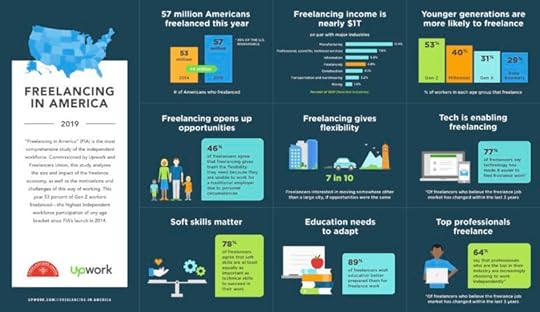

When I moved to Nashville in 2014, I noticed something.
I didn’t realize how critical of a trend it was going to become, the extent that it was going to impact everyday life, the rapid rate at which it was growing, or how it was going to become the new normal, but it seemed like everyone had a side hustle or a gig.
Okay, maybe not everyone, but close to half of the people I met.
And for the majority of them, these gigs weren’t their main source of income—a lot of them were hustling, contracting, and moonlighting on the side to earn some extra cash, pay down debt, or save up for a vacation.
It was kind of like cauliflower, podcasting, and Amazon Prime—no matter where you went, it was hard to miss.
Heck, even I was a part of this trend with all the writing, podcasting, consulting, and speaking I was doing on the side.
At first, I thought this was an American thing, since I had just moved to the States, but after talking to friends in Canada, reflecting back on the time my wife and I lived in Korea, and doing some research, I quickly realized how much of a global trend this was becoming—and how rapidly it was growing.
Have you seen it? Do you know anyone with a side hustle? Or gigging?
Where they’re working multiple jobs? Where at least one of those jobs is them working for themselves?
Perhaps they’re selling things on Facebook Marketplace?Doing a side job as a contractor?Driving for Uber or Lyft?Freelancing?Delivering food for Grubhub or Skip a Dish?Renting out their place on Airbnb?Or how about someone who has quit their full-time job, with guaranteed salary and benefits, to start their own thing?
It’s called the gig economy and it’s become the new normal.
In 2019, 35% of the American workforce was a part of the gig economy—up from five years prior. That means 57 million Americans were self-employed in a part-time or full-time capacity getting paid for their time, skills, possessions, or expertise.
To give you some perspective, that’s more people than the entire populations of Canada, Liberia, Greece, and Puerto Rico combined!
The gig economy has become the new normal because of the way it’s changing everyday life.
Click To Tweet
And what’s so surprising about it all is just how rapidly the gig economy has grown.
I mean, can you believe that 68% of all gig workers surveyed joined the gig economy in the last five years? You see similar trends in Canada, the United Kingdom, and Australia, where the growing gig economy continues to affect normal everyday work, life, and love.
Just check out this one infographic on what the gig economy looks like in America and some of the implications.
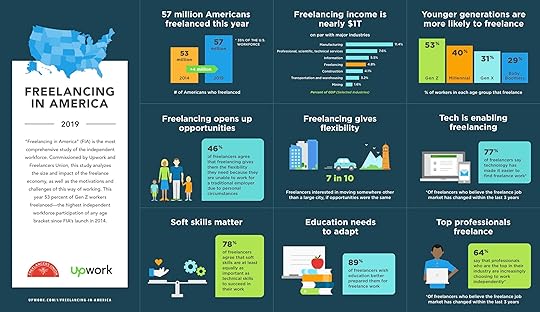
The gig economy has quickly become the new normal because of the way that it’s changing everyday life.
You don’t even need to be working in it for it to affect you. Just think about the last time you bought something off of Facebook Marketplace, rode in an Uber, ordered food using an app, slept at an Airbnb, or got your IKEA furniture assembled by a Tasker from TaskRabbit.
That was all possible thanks to the gig economy and someone else’s side hustle.
The same is true even without an app, because every time you get a haircut, hire a contractor, have your lawn mowed, or hire a babysitter, you are also funding the gig economy.
Now you might be thinking, what does the gig economy have to do with me as a Christian? Or as a pastor or leader in the church?
The quick answer is way more than you might realize. But here’s the longer answer, and I’ll address it two ways:
1) How the gig economy affects everyone in your church
2) How the gig economy affects church leaders
How The Gig Economy Affects Everyone In Your Church
While I was researching the implications of the gig economy on everyday life for my new book, You Are What You Do: And Six Other Lies about Work, Life, and Love, I noticed a loose thread.
Initially, I ignored it, thinking that it was probably nothing. But the longer I spent investigating how the gig economy affected everyday life, the more the loose thread seemed to stick out. It kept jeering and taunting me to pull it. So I did. And that’s when things began to unravel.
The glitz and glamor of the gig economy came undone the more I pulled. Stitch after stitch loosened and fell apart, until I was eventually left with a mangled heap of lies:
1) You are what you do
2) You are what you experience
3) You are who you know
4) You are what you know
5) You are what you own
6) You are who you raise
7) You are your past
The rise of the gig economy has made each of these seven lies so compelling because the gig economy promises us freedom and flexibility….it gives us the illusion of control.
The gig economy gives us the illusion of control.
Click To Tweet
“You have unlimited earning potential,” says the gig economy, “so if you want to go on a trip, just gig for a few hours.” “Want that new outfit? Sell a few things.”“Want the latest phone? Hustle for it. After all, everyone has free time that they waste, so just use that time and earn some extra cash.” “Be productive! You’re in control, so make it happen—rise and grind and get it done.”
Underneath the allure of the freedom and flexibility that the gig economy promises, are these 7 lies that are trying to change the way that we approach work, life, and love
No wonder these lies have become the new way to view ourselves!
They are the means to an end, since believing in them, and living our lives according to them, is apparently the “promised” path to freedom and flexibility.
Apparently, believing in these 7 lies is the “promised” path to freedom and flexibility.
Click To Tweet
And here’s the reason it’s so easy to fall into the trap of believing these lies. It’s because they are half-truths! Not the kind that are outright harmful, evil, or unjust. They’re the kind of half-truths that mingle truth and falsehood with the subtle and deliberate intent to deceive.
And in our day and age of fake news where half-truths are everywhere, these ones don’t actually seem too bad—which is precisely why they are so deceptive.
So if that’s just a glimpse into how the gig economy affects everyone in your church—whether they’re Christian or not—how does the gig economy affect leaders in the church?
That’s the topic of next week’s post.
In the meantime, if you’re interested in unpacking and learning more about the way these seven lies have seeped into our culture and our everyday work, life, and love, be sure to pick up a copy of my new book, You Are What You Do: And Six Other Lies about Work, Life, and Love.



